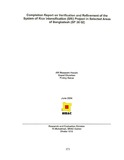Completion report on verification and refinement of the System of Rice Intensification (SRI) project in selected areas of Bangladesh (SP 36 02)
Citation
Husain, A. M., Chowhan, G., & Barua, P. (2004, June). Completion report on verification and refinement of the System of Rice Intensification (SRI) project in selected areas of Bangladesh (SP 36 02). Research Reports (2004): Social Studies, Vol – XXXV, 171–267.Abstract
The System of Rice Intensification (SRI) was first developed in the 1980s in
Madagascar by Fr. Henri de Laulanie, which offers unprecedented opportunities for
improving rice production without dependence on high cost modern inputs. About 20
countries of the world have been currently conducting trials to further explore the
potentials of SRI in their own countries. Bangladesh needs a rice production system
to significantly improve productivity with less dependence on high cost inputs for
sustaining production and improving food security and livelihoods of its farmers most
of whom are resource poor.
Considering the potentiality of SRI to achieve this aim, trials were started in
Bangladesh in 1999 on a few farms. Initial success encouraged the participating
institutions to undertake organized and co-ordinated trials and research on SRI. At
this stage, this sub-project was approved by IRRI-PETRRA for a period covering two
boro season trials beginning 2002-2003.
The objective of the sub-project was to try out the SRI practice of rice farming at
farmers' field to explore its potentiality in enhancing productivity in a sustainable
manner for improving the livelihoods of resource poor farmers. Trials were
conducted in eight selected areas in the country by four partner organisations -
BRAC, SAFE, POSD and Syngenta Bangladesh Ltd. Among the limitations of the
sub-project were the short period of the study, shortage of organic fertilizer
availability, and the very small scale of trial plots that hampered an effective water
management.
The SRI trials involved motivation of farmers, organising them into Farmers' Field
Schools (FFS), training of different aspects of SRI practices, monitoring their
production activities, collecting and analysing the data to arrive at results,
participatory evaluation of the findings, and communication of the results through
workshops, evaluation and completion reports, manuals, posters, stickers, etc.
The findings of the trials conducted during two Boro seasons, 2002-03 and 2003-04,
showed that total number of participating farmers increased by 62% during the
second year and SRI acreage also significantly increased by 90% during the same
period. Agronomic findings showed that in case of all sub-project partners, number
of tillers per hill was higher for SRI plots than that under farmers' plots. Panicle
length under SRI was also larger than that under farmers' practice in case of all
partners in both seasons. Grain weight per thousand grains was also more under
SRI practice while per cent of unfilled grain was lower. Per hectare gross costs of
producing rice under SRI were lower than that under farmers' practice in both
seasons. Results showed that farmers mainly saved seed and insecticide costs
under SRI. Irrigation costs could not be saved except for POSD due to irrigation
management problems. Both yield and gross returns were significantly higher under
SRI. Net returns per hectare under SRI were also significantly higher ranging from
35% to 73%. Thus in both seasons, while costs were less, yield and profitability of
SRI were found to be significantly higher than that under farmers' practice in case of
all sub-project partners, in spite of many shortcomings faced by participating farmers
in applying SRI methods.

